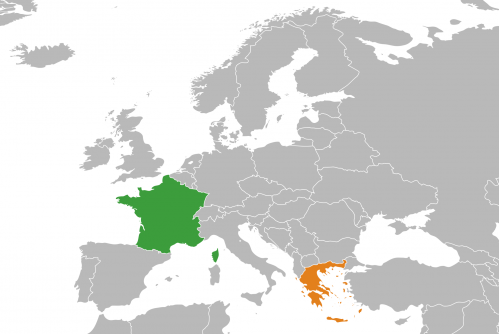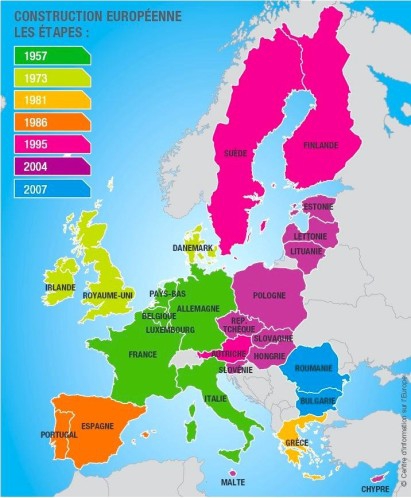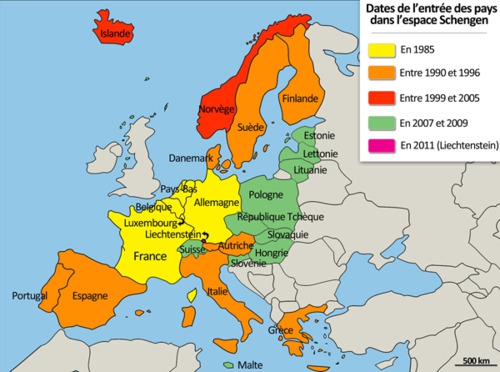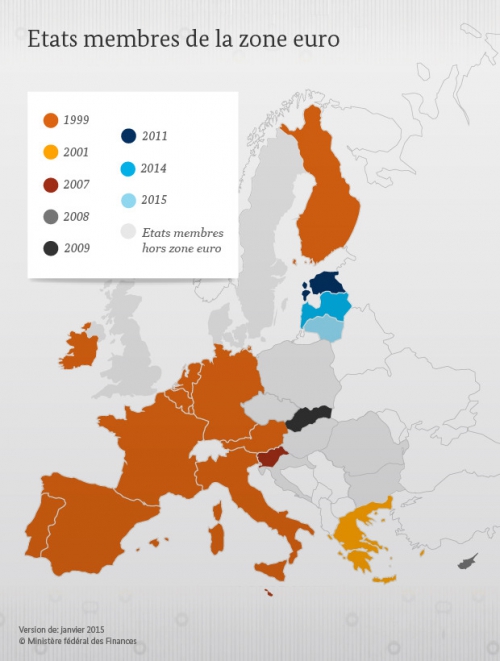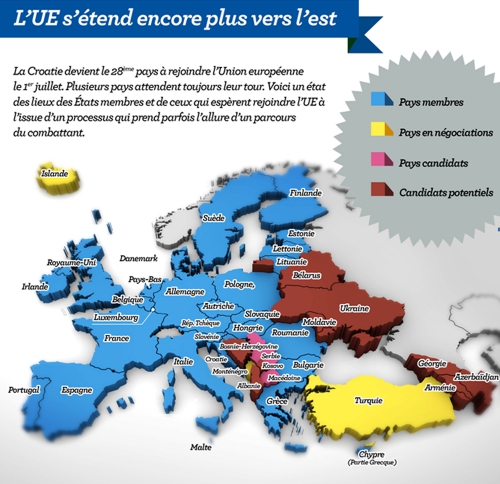The history of Greece in the European Union
I- the history of the European Economic Community
The EEC was created in 1957 by 6 countries :
-
France
-
Federal Republic of Germany (FRG)
-
Luxembourg
-
Italia
-
Belgium
-
the Netherlands
In 1973, the United Kingdom, Ireland and Denmark ; in 1981, Greece and in 1986, Spain and Portugal joined the EEC.
II- Greece's integration in the EEC
When the Regime of the Colonels (1967-1974) collapsed, Greece dropped off his candidacy to the EEC, the 12th June, 1975. Agricultural and economic questions ( the GDP was too low ; the rate of unemployment, too high compared to the other EEC's countries ; the inflation too great ; some EEC members expressed fears about Greece), as well as Turkey's integration slowed the process of adherence. Finally, on the 1st of January, 1981 Greece joined the EEC.
Greece (in orange) is the 10th country to have integrated the EEC after France, Italy, Luxembourg, Germany, Belgium, the Netherlands,the United Kingdom, Ireland and Denmark.
http://en.wikipedia.org/wiki/France%E2%80%93Greece_relations
Konstantínos Karamanlís
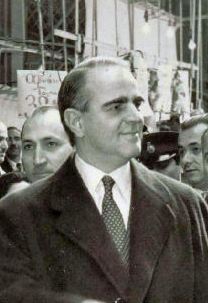 http://fr.wikipedia.org/wiki/Konstant%C3%ADnos_Karamanl%C3%ADs_(1907-1998)
http://fr.wikipedia.org/wiki/Konstant%C3%ADnos_Karamanl%C3%ADs_(1907-1998)
He was Greece Defence Minister, then Prime Minister. He was elected President of the Republic in 1980 and was President during 5 years. In 1990 he was elected for a second time.
In 1961 the ERE (Karamanlis's political party) won the elections and after that, he said that the results were fixed and that the fraud had been organized by the palace. The political troubles increased when Papandreou refused to accept Karamanlis's government and when he started a struggle against Karamanlis less than a month after the elections.
The tensions between the Prime Minister and the palace increased again when Karamanlis opposed a fundraising initiative by Queen Frederika. In July 1963, after a disagreement with King Paul(Greece king) Karamanlis was fired from his Prime Minister's position and for four months, lived in a foreign country. In November, Karamanlis and his political party lost the parliamentary elections against Georgios Papandreou's political party. He was disappointed so he fled Greece under the name Triadafyllithis. He went into self -imposed exile for eleven years in Paris(France) and became friend with Valery Giscard d'Estaing (a former French President). Panagiotis Kanellopoulos replaced him at the head of the ERE (National Radical Union)
Andréas Papandréou
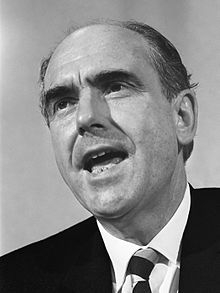 http://fr.wikipedia.org/wiki/Andr%C3%A9as_Papandr%C3%A9ou
http://fr.wikipedia.org/wiki/Andr%C3%A9as_Papandr%C3%A9ou
Andréas Papandréou was a Greek economist and politician. He was the PASOK's founder( the Greek socialist party). He was Prime Minister twice, from 1981 to 1989 and from 1993 to 1996. Both his father and his son were Prime Ministers too. He was arrested for purported Trotskyism, he was sent to jail and tortured in 1939, during the Fascist Metaxas's dictatorship. Then he was allowed to go into exile in the USA. After that, he came back in Greece in 1961 to manage the economic planning Center at Karamanlis's request.
After the coup of April 21, 1967 he went into exile again in the USA. Over there, Andréas Papandréou created the Panhellenic Movement of liberation which recommended the armed struggle against the colonels's dictatorship and crtiticized the USA, the NATO and the European economic community because of their kind policy concerning the army.
III- Greece's place in the EU, the Schengen area and the euro area.
Greece's place...
a- … in the european union :
In 1992, the Maastricht Treaty turned the EEC into the European Union (EU). It now has 28 members.
http://lycee-louis-payen.ac-reunion.fr/construction-europeenne
The European Union has expanded into 8 parts :
- First, France and Germany (the two pillars of the EU) have joined the European Union as well as Italy, Belgium, Luxembourg and the Netherlands.
- In 1973, the EU has expanded to the north of Europe, with the admission of Ireland, the United Kingdom and Denmark.
- In 1981, Greece was the only country to join the EU. Shortly after, in 1986, Spain and Portugal also joined this union.
- In 1995, only three countries joined the EU, Austria, Finland and Sweden.
- It is in 2004 that the EU is the most expanding with the entry of countries in Eastern Europe such as Slovenia, Hungary, Slovakia, the Czech Republic, Poland, Lithuania, Latvia, Estonia and Malta and Cyprus.
- Finally, the last countries that joined the EU are the countries of southeastern Europe such as Romania and Bulgaria in 2007 and Croatia in 2013.
b- … in the Schengen area :
June 14th, 1985, in Schengen, agreements were signed by five countries: Belgium, France, Luxembourg, the Netherlands and Germany. The purpose of these agreements is to phase out the borders of the Member States so that people belonging to it can move freely. All the States belonging to it are therefore called the Schengen area.
Today, 26 states are members.
http://milanpresse-presidentielle.com/post/19338316604/cest-quoi-lespace-schengen
The Schengen area has expanded into 5 parts:
- Initially, in 1985, the Central European countries such as France, Luxembourg, Belgium, the Netherlands and Germany have joined the Schengen area.
- Then, between 1990 and 1996, the Schengen area has expanded in southern Europe such as Spain, Portugal, Italy, Greece and Austria but also in northern Europe such as Denmark, Sweden and Finland.
- Between 1999 and 2005, only Iceland and Norway joined the Schengen area.
- In 2007 and 2009, other European countries also joined this space such as Hungary, Slovakia, the Czech Republic, Poland, Lithuania, Latvia, Estonia and Switzerland.
- Finally, in 2011, Liechtenstein was the only country to join the Schengen area.
c- … in the euro area :
On 1, January 1999, the euro became the legal currency of eleven states. These states therefore form the euro zone (monetary area).
The euro zone is a monetary zone which includes the countries of the European Union that have adopted the euro as the single currency.
http://www.bundesfinanzministerium.de/Content/FR/Bilder/Mediatheque/Graphiques/etat-membre-zone-euro.html
The Euro zone has expanded into 7 parts:
- In 1999, Germany, Austria, Belgium, Spain, Finland, France, Ireland, Italy, Luxembourg, the Netherlands and Portugal joined the euro area.
- In 2001, Greece was the only country to integrate the euro area.
- Subsequently, several countries have joined the area as Slovenia in 2007, Cyprus and Malta in
2008 and Slovakia in 2009, Estonia in 2011 and finally Latvia in 2014.
IV- The opposition to the entrance of Turkey within the European Union.
Many countries were opposed to the entrance of Turkey in the European Union.
Germany, Austria, Cyprus, Denmark, Spain, France and the Czech Republic expressed their opposition to the entrance of Turkey in the European Union.
Greece was divided on the subject. Georges Papandreou, president of Socialist Party, former minister of Foreign Affairs, spoke in favour of the accession to the European Union.
The former Greek minister Kostas Karamanlis was one of the strongest supporters.
The Greek former minister of defence, Yannos Papantoniou, claimed that « if Turkey joins the European Union, it will be obliged, upon accession, to respect its rules and values, and that will solve a lot of problems for us ».
If certain litigations persist with the Turkey in particular in the demarcation of the border, in the Aegean Sea, the effective respect of freedom of religion, and the reunifying of Cyprus's territory, since 1999, the Greek authorities have implemented a policy of rapprochement with Ankara.
Greece supported the entry of Turkey en European Union. She expected better relations with Turkey in return.
http://www.bundesfinanzministerium.de/Content/FR/Bilder/Mediatheque/Graphiques/etat-membre-zone-euro.html

